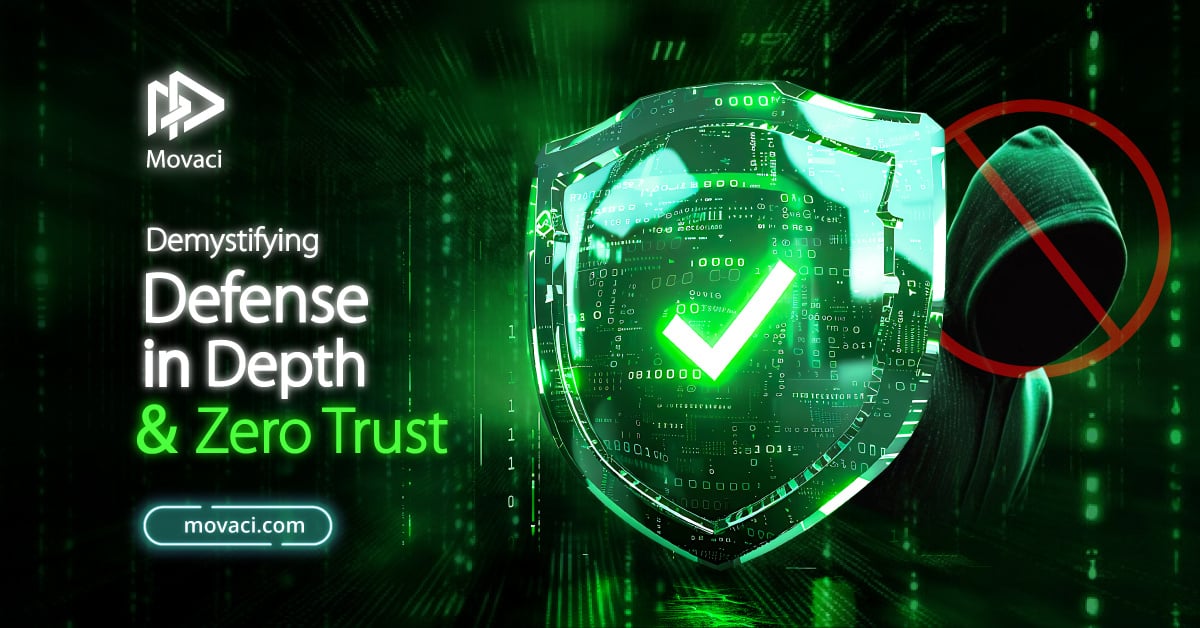In today’s digital-first world, cyber threats are no longer just a big-business problem. Small and...
Demystifying Defense in Depth and Zero Trust for Small and Medium Businesses
In today's cybersecurity landscape, two terms often surface: Defense in Depth and Zero Trust. While these concepts are common in large enterprises, they can seem out of reach for small and medium businesses (SMBs). At Movaci, we believe that robust security practices should be accessible to businesses of all sizes. Let's break down these concepts in simple terms and explore how they can benefit your organization.
Understanding Defense in Depth
Defense in Depth is a strategy that uses multiple layers of security to protect your business. Imagine your company as a medieval castle with several layers of defense – even if an attacker breaches one-layer, other barriers will still protect you.
Key Elements of Defense in Depth:
- Physical Security: Protect your physical assets, such as servers and workstations, with locks, access controls, and surveillance cameras.
- Network Security: Use firewalls, intrusion detection systems, and secure VPNs to protect your network infrastructure.
- Endpoint Security: Secure all devices connected to your network with antivirus software, encryption, and regular updates.
- Application Security: Protect your software applications by addressing vulnerabilities and ensuring secure coding practices.
- Data Security: Encrypt sensitive data and implement strong access controls to prevent unauthorized access.
- Operational Security: Develop and enforce policies and procedures to manage and protect your digital assets.
Understanding Zero Trust
Zero Trust is a security model based on the principle of "never trust, always verify." Unlike traditional security models that trust users and devices inside the network, Zero Trust assumes threats can come from anywhere. Therefore, every access request is thoroughly checked before granting access.
Core Principles of Zero Trust:
- Verify Explicitly: Always authenticate and authorize based on all available data points, including user identity, location, and device health.
- Least Privilege Access: Give users the minimum access they need to do their jobs, reducing the risk of insider threats.
- Assume Breach: Act as if your network is already compromised and continuously monitor and improve your security.
How to Apply These Concepts to Your Business
Implementing Defense in Depth and Zero Trust doesn't require a massive budget or an army of IT professionals. Here are some practical steps SMBs can take to enhance their security:
- Assess Your Current Security Posture: Conduct a thorough security assessment to identify vulnerabilities and areas for improvement.
- Implement Layered Security: Start with the basics, such as strong passwords, firewalls, and antivirus software. Gradually add more layers as your budget allows.
- Adopt Zero Trust Practices: Implement multi-factor authentication (MFA) and regularly review access controls to ensure that only authorized users have access to critical systems.
- Partner with Experts: Collaborate with security experts, like Movaci’s Consulting & Solutions team, to tailor a security strategy that fits your specific needs and budget.
Why Partner with Movaci?
At Movaci, we understand that SMBs face unique challenges in securing their digital assets. Our team of experts is here to help you navigate the complexities of cybersecurity, providing customized solutions that align with your business goals. Whether you need assistance with implementing Defense in Depth, adopting Zero Trust practices, or optimizing your overall security posture, we’re here to support you every step of the way.
Ready to Enhance Your Security?
Contact Movaci’s Consulting & Solutions team today to learn how we can help you implement, secure, and optimize your business’s technology and security practices. Let’s work together to build a safer future for your organization.




